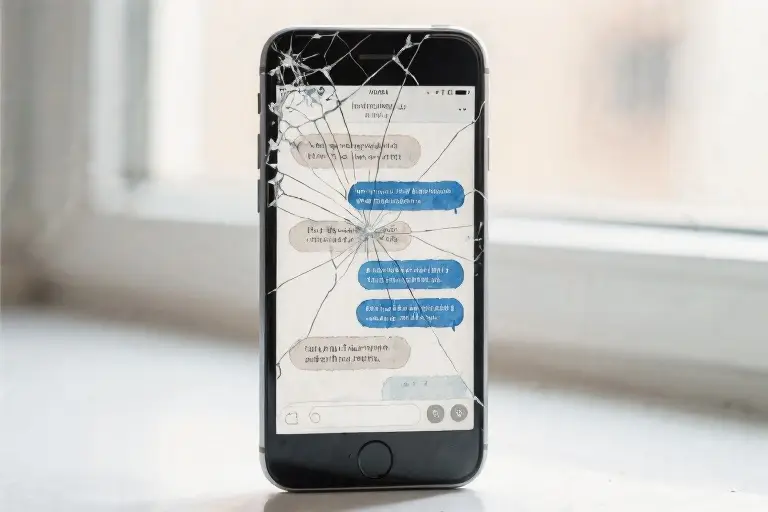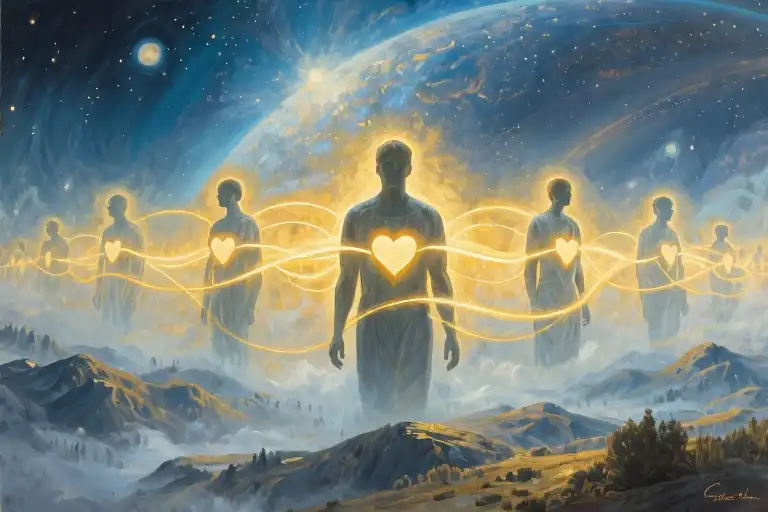The conversation had turned to sunsets, as conversations often do when the light begins to fade and people search for something beautiful to say. Someone mentioned the way the horizon holds color long after the sun disappears, and there you were—not suddenly, not dramatically, but with the quiet insistence of something that has learned to live in the spaces between memory and muscle.
You exist there now, in that soft place where recollection doesn’t hurt so much as it simply is. A presence acknowledged but no longer sharp at the edges. The realization comes gently: you were real. You happened. And for a time that now feels both vast and miniature, you were everything.
It’s strange how certain names become quiet ghosts in our stories. You’re no longer part of my daily life, yet you surface in my words like an old song playing in an empty room, or the particular scent that still makes you turn your head even when you’ve forgotten why. Some departures leave no visible marks, but the echo remains—not as a wound, but as proof that something significant once passed through.
Some people leave quietly, but the echo stays loud.
This isn’t about longing. Not really. It’s about the ordinary miracle of having been changed by someone who no longer walks beside you. About how the most personal revolutions often go unrecorded, leaving only these subtle shifts in how light falls through your windows, or which street corners make you pause. The sunset conversation continues around me, but I’m thinking about how we carry people in the quietest parts of ourselves—not as burdens, but as evidence that love, in all its forms, leaves fingerprints even when the hands have gone.
The Shapes of Memory
A coffee cup left on the kitchen counter with fingerprints still visible around its rim. The way certain subway announcements sound in the early evening, when the station echoes differently. These ordinary things become vessels for what we can’t hold anymore.
Memory doesn’t announce its arrival. It slips in through the back door of your senses, settling into that soft space between recollection and reflex. You might be stirring sugar into your tea when suddenly your hands remember another kitchen, another time. The muscles know before the mind does.
They’re quiet ghosts, these memories. Not the rattling-chain kind from storybooks, but the barely-there presence of someone who once mattered. You’ll catch them in peripheral moments – when a song plays faintly from a passing car, or when the light falls at a particular angle. They don’t haunt so much as linger, like the scent of rain on pavement long after the storm has passed.
The strangest part isn’t that they remain, but how they change. What once ached now simply… is. The edges soften with time, until you can hold the memory without bleeding. You existed. You were real. These statements no longer come with sharp inhalations or tightened throats. They’re just facts, whispered into empty rooms.
Echoes behave strangely in emotional spaces. Some voices fade quickly, while others bounce endlessly off unseen walls. The loudest aren’t always the ones that shouted – sometimes it’s the barely spoken things that resonate longest. A glance held a second too long. A sentence left unfinished. These are what echo.
There’s comfort in this persistence. The memories that stay aren’t the dramatic ones, but the ordinary moments that somehow became extraordinary by being shared. The way they surface now feels less like intrusion and more like visitation. Not a wound reopening, but a familiar hand briefly squeezing yours across time.
We keep these echoes not because we’re stuck, but because they’ve become part of our architecture. They’re the invisible beams that shape how we stand in the present. To remove them would leave us structurally unsound. So we let them resonate, learning the difference between living in the echo and simply letting it live with us.
The Unnamed Echoes
A friend once asked me why I never say your name when I talk about you. The question hung in the air between us like dust particles caught in afternoon light. I stirred my coffee, watching the spoon leave temporary whirlpools in the dark liquid. “Because names make ghosts too real,” I finally said.
There’s something about proper nouns that gives memories sharp edges. When we attach labels to our past – “the one who left,” “the mistake,” “my greatest love” – we risk turning living, breathing history into museum exhibits behind glass cases. The unnamed memories stay fluid, changing shape with each retelling like clouds reforming at sunset.
Psychology tells us this avoidance serves a purpose. Not naming the pain allows for what therapists call “constructive ambiguity” – that gray area where healing happens without rigid narratives. When we refuse to categorize our experiences as purely tragic or beautiful, we create space for the full spectrum of what was. The coffee dates that smelled like cinnamon, the arguments that left throat-raw silence, the handwritten notes tucked in lunchboxes – all equally valid, none requiring definition.
I’ve developed rituals around this silence. When sharing stories where you appear, I’ll pause mid-sentence to trace the rim of my glass. Listeners learn to recognize these pauses as parentheses around your presence. Sometimes they’ll ask for details I won’t give. “What was he like?” becomes “What was that time like?” in our unspoken agreement to focus on the experience rather than the actor.
This isn’t about erasure. The opposite, really. By not reducing you to a name or role, I preserve your complicated humanity – and mine. Our story becomes less about two characters and more about the emotional landscape we inhabited: that peculiar light of 3pm winter sun through your apartment windows, the specific weight of your sweater when you draped it over my shoulders, how rain sounded on the tin roof of the diner where we always ordered pie.
Occasionally someone will push harder. “But don’t you think giving it a name would help you move on?” they’ll ask, mistaking my silence for suppression. I used to struggle with answers. Now I simply say: “Some songs are more beautiful when you can’t quite recall the lyrics.” The melody remains, pure and unburdened by language’s limitations.
What we don’t name, we can’t confine. These memories stay wild – slipping through the cracks of therapy terms and relationship categories. They surface when certain chords play in department stores, when I catch whiffs of your shampoo on strangers, when someone mentions how the light turns gold just before dusk. Not as hauntings, but as proof: some loves don’t need tombstones to be remembered.
In the end, this silence isn’t really about you at all. It’s about protecting that version of myself who existed in your presence – the one who laughed differently, who noticed subtler colors, who believed in fiercer possibilities. She deserves more than a label. She deserves the whole, messy, unnamed truth.
The Alchemy of Sharing
There are moments when the past slips into a conversation like an uninvited guest. Not with drama or fanfare, but with the quiet persistence of an old song playing faintly in another room. I found myself describing you last Tuesday over lukewarm coffee – not your name, not the sharp edges of our ending, just the way autumn light used to catch in your hair when you’d glance up from a book.
My friend stirred her spoon absently, the clink of ceramic filling the space where details should have been. What surprised me wasn’t the telling, but how weightless it felt. This wasn’t confession; it was archaeology. With each shared fragment – the way you hummed off-key in elevators, your irrational hatred of velcro – I wasn’t excavating us. I was recovering the version of me who knew these things.
We think of memories as artifacts to preserve, but they’re more like watercolors – their meaning changes depending on what paper we choose to paint them on. That evening, I discovered something elemental: sharing stories isn’t about keeping ghosts alive. It’s about tracing your own outline in the negative space they left behind.
Try this tonight with a memory you’ve carried silently. Not the capital-T Truth of what happened, but some small, true thing – the brand of gum they always chewed, the way their sneakers squeaked on linoleum. Speak it aloud to your bathroom mirror if no one else is around. Notice how the memory shifts when released into the air, how the act of selecting which details to voice makes you curator rather than captive.
There’s profound alchemy in this selective sharing. By refusing to name you, I’m not erasing our history – I’m reclaiming authorship of it. The stories we choose to tell become the fossils future selves will use to reconstruct who we are. What matters isn’t factual accuracy, but the emotional truth we distill through retelling.
Next time someone mentions sunsets, don’t flinch from the echo. Lean into that sensory memory – the exact hue of twilight through their windshield, the static of radio stations bleeding together. Then share it plainly, without context or consequence. You’ll find the past loses its grip when you stop treating it like a secret and start handling it like a found object in your pocket, worn smooth by time.
The light fades differently these days. It lingers longer in the corners of rooms, spills gold across tabletops in a way that makes me pause mid-sentence. Someone mentioned sunsets yesterday—just a passing comment about beach vacations—and there you were again, not as a wound but as a presence, like the afterimage of a bright light when you close your eyes.
These moments never arrive announced. They slip in through the back door of consciousness when I’m stirring honey into tea or tying shoelaces. You exist in the space between what my hands remember and what my mind chooses to recall. The body keeps score in its own quiet language: how my shoulders still tense at certain songs, how my fingers trace the spine of books we once read together without thinking.
Some people leave quietly, but the echo stays loud. I’ve learned this isn’t contradiction—it’s physics. The absence rings clearer than presence ever did. Not with pain now, just recognition, like noticing an old scar when sunlight hits it at an unfamiliar angle.
When I talk about you, I don’t use your name. Not out of avoidance, but because names pin things down, and what remains of you belongs to that floating world between memory and muscle. To say your name would be to trap the echo in a jar, when all it wants is to keep traveling through the hollow spaces, changing shape with each new surface it touches.
The sunset today is the particular orange of apricot jam. I watch it smear across the sky and think about how we measure loss in these small, senseless details. Not in grand gestures or dramatic last words, but in the way a certain slant of light can still make the air feel different, like a room someone has just left.





